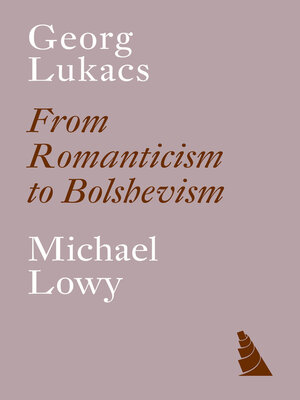
Sign up to save your library
With an OverDrive account, you can save your favorite libraries for at-a-glance information about availability. Find out more about OverDrive accounts.
Find this title in Libby, the library reading app by OverDrive.



Search for a digital library with this title
Title found at these libraries:
| Library Name | Distance |
|---|---|
| Loading... |
On the 100th anniversary of the publication of History and Class Consciousness, a new edition of this indispensable guide to Lukacs's thought and politics
The philosophical and political development that converted Georg Lukács from a distinguished representative of Central European aesthetic vitalism into a major Marxist theorist and Communist militant has long remained an enigma.
In this this now classic study, Michael Löwy for the first time traced and explained the extraordinary mutation that occurred in Lukács's thought between 1909 and 1929. Utilizing many as yet unpublished sources, Löwy meticulously reconstructed the complex itinerary of Lukács's thinking as he gradually moved towards his decisive encounter with Bolshevism.
The religious convictions of the early Lukács, the peculiar spell exercised on him and on Max Weber by Dostoyevskyan images of pre-revolutionary Russia, the nature of his friendships with Ernst Bloch and Thomas Mann, were amongst the discoveries of the book.
Then, in a fascinating case-study in the sociology of ideas, Löwy showed how the same philosophical problematic of Lebensphilosophie dominated the intelligentsias of both Germany and Hungary in the pre-war period, yet how the different configurations of social forces in each country bent its political destiny into opposite directions. The famous works produced by Lukács during and after the Hungarian Commune—Tactics and Ethics, History and Class Consciousness and Lenin—were analysed and assessed. A concluding chapter discussed Lukács's eventual ambiguous settlement with Stalinism in the thirties, and its coda of renewed radicalism in the final years of his life.
In this new edition, Löwy has added a substantial new introduction which reassess the nature of Lukacs's thought in the light of newly published texts and debates.
The philosophical and political development that converted Georg Lukács from a distinguished representative of Central European aesthetic vitalism into a major Marxist theorist and Communist militant has long remained an enigma.
In this this now classic study, Michael Löwy for the first time traced and explained the extraordinary mutation that occurred in Lukács's thought between 1909 and 1929. Utilizing many as yet unpublished sources, Löwy meticulously reconstructed the complex itinerary of Lukács's thinking as he gradually moved towards his decisive encounter with Bolshevism.
The religious convictions of the early Lukács, the peculiar spell exercised on him and on Max Weber by Dostoyevskyan images of pre-revolutionary Russia, the nature of his friendships with Ernst Bloch and Thomas Mann, were amongst the discoveries of the book.
Then, in a fascinating case-study in the sociology of ideas, Löwy showed how the same philosophical problematic of Lebensphilosophie dominated the intelligentsias of both Germany and Hungary in the pre-war period, yet how the different configurations of social forces in each country bent its political destiny into opposite directions. The famous works produced by Lukács during and after the Hungarian Commune—Tactics and Ethics, History and Class Consciousness and Lenin—were analysed and assessed. A concluding chapter discussed Lukács's eventual ambiguous settlement with Stalinism in the thirties, and its coda of renewed radicalism in the final years of his life.
In this new edition, Löwy has added a substantial new introduction which reassess the nature of Lukacs's thought in the light of newly published texts and debates.







